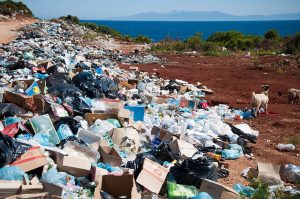Negotiations towards an international legally binding instrument (ILBI) on plastic pollution, including in the marine environment, have officially gotten underway. The first intergovernmental negotiating committee (INC) meeting delved into the form and substance of the future treaty, for which negotiations are expected to conclude in 2024.
During the first of five expected INC meetings, Inger Andersen, UN Environment Programme (UNEP) Executive Director, reiterated that in order to build an ILBI addressing the entire lifecycle of plastic, broad participation, science-driven action, stakeholder engagement, and innovative thinking are needed, the Earth Negotiations Bulletin (ENB) reports.
Delegates addressed: scope, objectives, structure, and potential elements of the instrument; standard articles on final provisions; and sequencing and recommended further work to be undertaken. The INC heard a range of proposals, and requested the INC Secretariat to prepare a document, ahead of INC-2, that outlines options for elements of the instrument, such as the treaty’s objective, and substantive provisions including core obligations, control measures, voluntary approaches, and means of implementation, noting the document could include both legally binding and voluntary measures. While an understanding emerged on the need for the treaty to encompass the full lifecycle of plastics, the definition of “lifecycle” has not yet been agreed.
Some delegations supported voluntary national measures, with some calling for an approach based on national circumstances, underpinned by a bottom-up approach and nationally determined action plans, without global standardization and harmonization. Others preferred a more top-down, global approach. For example, some supported national action plans as the cornerstone of ILBI implementation, while others felt they should complement global measures and be used to monitor implementation and address issues related to compliance.
Delegates also discussed: means of implementation, including capacity building, technical assistance, and finance; monitoring and evaluation of progress in, and effectiveness of, implementation and national reporting; scientific and technical cooperation and coordination, research, and awareness raising; and stakeholder participation and action.
On sequencing and recommended further work, proposals included: asking the Secretariat to prepare a detailed policy options paper for control measures; establishing contact groups on control measures and means of implementation; and financial support for attendance of two representatives from each developing country.
The UN Environment Assembly (UNEA) adopted the decision to initiate negotiations on a global plastics treaty in March 2022. INC-1 convened online and in person in Punta del Este, Uruguay, from 28 November to 2 December 2022. More than 2,300 delegates from 160 countries and stakeholder groups participated. Prior to the meeting, more than 1,000 participants attended a Multi-Stakeholder Forum, both in person and virtually. During INC-1, an additional stakeholder dialogue convened, addressing upstream and downstream approaches to plastic pollution and the mid-stream stage of the plastic lifecycle.
France offered to host INC-2 in Paris from 22-26 May 2023. Kenya offered to host INC-3, Canada – INC-4, and the Republic of Korea – INC-5. Ecuador, Peru, Rwanda, and Senegal offered to host the diplomatic conference of plenipotentiaries in mid-2025. [ENB Coverage of Plastic Pollution INC-1]

